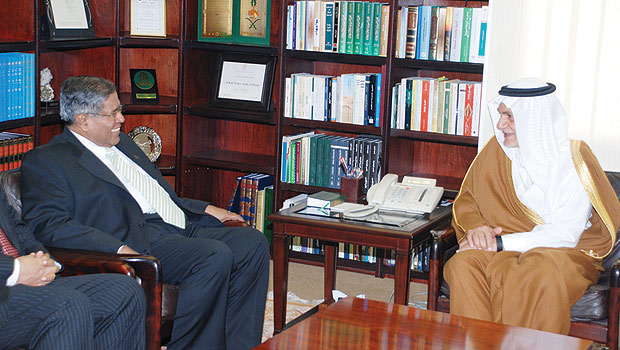There will be a sharp rise in the share of emerging economies in the global GDP from 20 percent in 2000 to 41 percent by 2016 as per projections and economic indicators currently available, he added.
Khan said G20 member states have taken on a new prominence in the current economic crisis. “The G20 nations cumulatively represent 95 percent of the world's economy and hence there is a need for the parliaments and legislative bodies of the G20 states to work closely to solve the international financial crisis,” added the deputy chairman, while thanking chief of the Shoura Council Abdullah Al-Asheikh for hosting the G20 speakers' conference and for the hospitality extended to the Indian delegation.
In a wide-ranging interview, Khan gave an overview of the growing Saudi-India relations. Khan met with Al-Asheikh on the sidelines of the conference. He also met with Prince Turki Al-Faisal, chairman of King Faisal Center for Research and Islamic Studies.
Khan discussed with Prince Turki several bilateral and regional issues and offered a renewed invitation to the prince to visit India. Khan is scheduled to hold talks Dr. Abdullah Al-Rabeeah, minister of health, in Riyadh today.
Khan is accompanied by Dr. V. K. Agnihotri, secretary-general of Rajya Sabha; Badruddin Khan, director of the deputy chairman's office; and Rakesh Anand, deputy director of the Parliament.
Referring to the G20 speakers' conference, Khan said: “Parliaments need to be sensitive to local and international developments taking place because of the policies of respective governments that eventually affect the people and the world at large. The parliaments of the G20 countries have become active, interacting among themselves…enabling them to discuss issues of local and international importance because the governments eventually come to parliaments to enact laws.”
He said India maintains excellent relations with all countries in the Middle East, especially Saudi Arabia, a country that has been playing an increasingly important role in world economy due to its status in the global energy market, the sheer size of its economy and its political stability. He said: “The uncertainty in the global economy, particularly the financial instability emanating from the eurozone sovereign debt crisis, concerns all of us.”
Referring to the mandate of the G20 speakers with special reference to India, Khan said the Riyadh conference focused on the financial crisis and the need of sustainable development of energy on a priority basis. The situation is grim globally. It is estimated that some 3 billion people of the world lack access to energy and about 1.3 billion people mainly in sub-Saharan Africa and parts of Asia don't have access to electricity, according to a study released by the Shoura Council yesterday.
“The need to promote global interfaith dialogue prominently figured in the talks of the G20 speakers,” said Khan, adding there was a need to promote greater understanding among the people of diverse faiths. He said Turkey called “India a great symbol of harmony, peace and co-existence, a model to imitate.”
On the question of institutionalizing the G20 speakers' conference, he said: “We are currently holding consultative meetings…and this is the third round. It will take some more time…we have not discussed any institutionalizing mechanism or setting up any panel for the G20 speakers' conference, and it is too early to discuss that.”
On the uprisings in the Middle East countries, he said: “India wants peace in the Middle East region, and we will do all that is possible to ensure peace and security in the Middle East.”
Asked about the need to promote Islamic banking in India, he said the Jeddah-based Islamic Development Bank (IDB) has expressed its keenness to cooperate with India in the fields of Islamic banking and development of Wakf properties in India. “We have 400,000 hectares of Wakf land in India and the IDB is willing to develop some of them,” said Khan.
A proposal to establish a Wakf development corporation is currently under serious consideration of the Indian government, said Khan. He pointed out that half of the Wakf properties can be developed into fruitful projects.
In a frank admission, the Indian leader blamed the bureaucracy for their myopic approach to introducing Islamic banking in India. It is the prefix “Islamic” that is creating confusion, said Khan. “I would like to know what the constraints are in launching Islamic banking in India.” He pointed out that a non-banking finance company on the model of Islamic banks has already been set up in India.
On a bilateral front, Khan recalled some visits of top Saudi officials to India. He said the visit of Sheikh Abdul Rahman Al-Sudais, imam of the Grand Mosque in Makkah, to India was one such great occasion. The imam gave a message of love to India where people of different religions live together in peace and harmony.
Khan, a chartered accountant-turned politician, pointed out Al-Sudais led the Isha prayers at his residence in New Delhi, where Prime Minister Manmohan Singh was also present. Khan will wrap up his three-day visit to Riyadh today.










